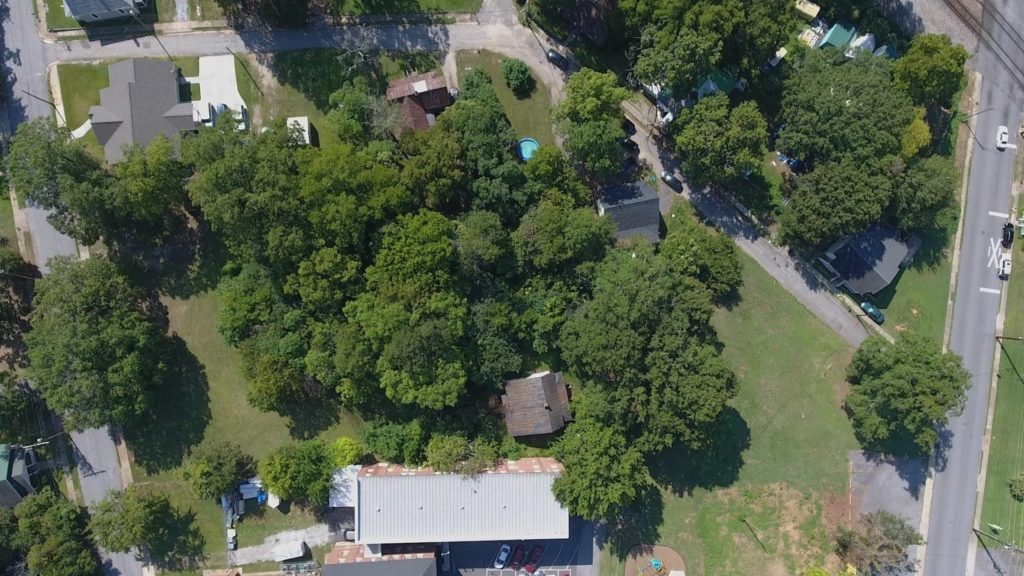By Gabriel Stovall
Meeting the needs is nothing new for First Baptist Church of Spartanburg, South Carolina.
In fact, the church has dedicated an entire church building to compassion ministry. But FBC Spartanburg wants to do much more. Within the next year, the church plans to build 24 “mini houses” near its main campus in downtown Spartanburg as part of a new ministry for women who are trafficking victims.
“Our church is a downtown church, and it gives us a great opportunity to reach the homeless downtown, which is something we’ve been doing consistently for the last eight years,” said Steve Wise, FBC Spartanburg’s missions pastor.
That ministry began with the church opening up its gym every Sunday morning and providing a hot shower, hot coffee, breakfast and Bible study to Spartanburg’s homeless population.
“We’ve seen over 900 different people come to us in that eight-year time frame,” Pastor Steve said.
 A rendering sketch of what First Baptist Spartanburg’s new subdivision of mini houses for women victimized by human trafficking would look like.
A rendering sketch of what First Baptist Spartanburg’s new subdivision of mini houses for women victimized by human trafficking would look like.
But it was actually the closing of Green Street Baptist Church, a congregation that was originally born out of FBC Spartanburg, that gave them even more capacity to do compassion ministry.
Two years ago, the Green Street congregation dwindled down to about 10 to 12 people, and once it became obvious that the church wouldn’t be able to continue, the remaining members decided to give the building back to FBC Spartanburg. And that’s how “The Bridge at Green Street” was born.
“The Bridge is where all of our compassion ministries are now housed,” Steve said. “After renovating the building to better fit our needs, we were able to go in and provide a food and clothing ministry, we were able to help with financial counseling and we were able to expand our outreach to the homeless. But that also helped us to prioritize our ministry better.”
Steve and the church found that the homeless population on the Northside Spartanburg area where The Bridge is located—approximately 1.5 miles from FBC Spartanburg’s main campus—had a large population of women whom had been victimized through human trafficking.
“It was dawning on us through our constant contact with the homeless that women without children were at high risk to be trafficked,” Steve said. “They were at high risk to encounter men with terrible intentions for them, a lot of times ending up exchanging favors to the men for their protection. It made us ask, ‘What if we could do something for women who’ve been victimized?’”
That’s when Steve and the FBC Spartanburg missions team started talking to the Northside Development Group. They became aware of a ministry in Easley, South Carolina, called the Dream Center which constructed a subdivision of small houses called Opportunity Village.
At first, Pastor Steve didn’t think the powers that be in Spartanburg would allow such a thing to take place.
“But it turns out the opposite happened,” he said. “They actually came to us and asked if we’d consider doing it.”
The effort is still in its early stages. The church is trying to buy one more plot of land and remove a house on another piece of land it already owns. So, for now it’s a bunch of gridding, plotting out exactly where the houses will go, planning infrastructure and also designing the details of the outreach program for the women who will occupy these homes. They’re loosely planning a Summer 2021 launch, although the pandemic has thrown many original plans up in the air.
 A rendering of what a mini house in FBC Spartanburg’s developing subdivision for trafficked women could look like.
A rendering of what a mini house in FBC Spartanburg’s developing subdivision for trafficked women could look like.
One thing is still sure. Pastor Steve wants what is happening with FBC Spartanburg and the former Green Street Baptist Church to be a model of encouragement for other churches that may be trying to see how they can still serve needs in their communities, despite dwindling numbers.
“The great thing about The Bridge and what we’re already doing and what we’re planning to do is that about 28 members of Green Street became members of First Baptist as Green Street was closing,” he said. “Now they’re some of our best volunteers in our ministry at The Bridge. It’s giving them an opportunity to see their former church’s vision to reach people for Jesus be reimagined. They see their church alive in a new form.
“There are probably thousands of churches in the South where this has happened. The church hasn’t changed with its neighborhood for whatever reason, and the first thing they think about is selling. But what if some of these churches could repurpose their ministry in some kind of way? I’d like to see more of that happen.”
Find out how your church can meet needs specific to your community.
Published July 31, 2020
